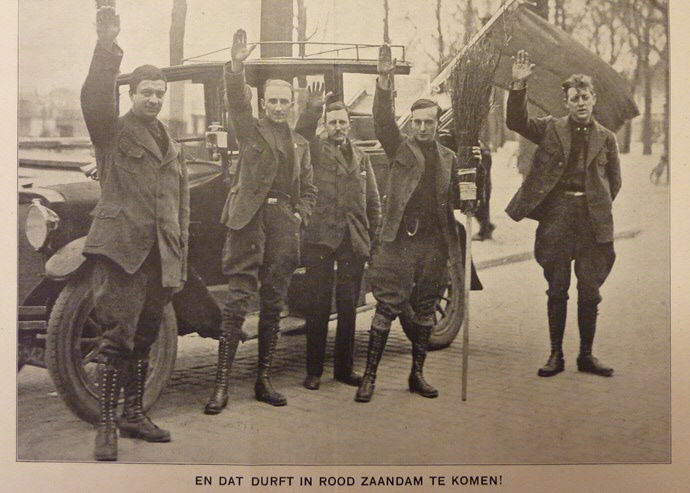Nature of Dutch fascism requires adapted definition

Dutch fascism differed from international fascism in its continued adherence to legal means to achieve its ideals. The non-revolutionary nature of Dutch fascism demands an adaptation of the usual definition of fascism as a political ideology in the period 1923-1945. This is one of the conclusions reached by PhD candidate Willem Huberts, based on his research on fascism of that period in the Netherlands. Huberts will receive his PhD from the University of Groningen on 9 March.
For the first time, an overview has become available of the more than sixty Dutch political initiatives between 1923 and 1945 that meet the minimum requirements of the definition of fascism. Dutch fascism encompassed more than the NSB, the party that became famous for its role before and during the war. Dutch fascism was characterized by fierce internal competition and the inability to rise above it. Huberts: ‘They were constantly trying to score at each other’s expense.’
Fascism defined
Usually, fascism from the period 1923-1945 is defined by four key characteristics: ultra-nationalism, populism, a revolutionary nature and a longing for the revival of a community. This is primarily based on fascism in Italy and Germany between 1923 and 1945. Huberts proposes an adaptation of the definition with respect to revolution, so that developments in other countries can also be better explained. ‘This non-revolutionary nature is not exclusively Dutch. Fascist ideals in Sweden and Romania were also pursued within the existing political order. It is strange not to be able to call them fascist, though.’
Troelstra and revolution
It is no coincidence that most Dutch fascists did not present themselves as revolutionaries. Contrary to Germany and Italy, the Dutch political system disfavoured the term revolution. Many people recalled the failed attempt by the social democratic leader, Troelstra, to start a socialist revolution in 1918. The subsequent political isolation of Troelstra and his party turned ‘revolution’ into a recipe for failure. One of the exceptions was Zwart Front, which sought fascist change through militant action.
Polder fascism
This background is important for a proper understanding of the Nationaal-Socialistische Beweging (National Socialist Movement) or NSB. Its leader, Anton Mussert, believed in the orderly political party as the proper manner to achieve power in the Netherlands. Legality through participation in elections was a political necessity for the NSB. As a result, the party met with both criticism and jealousy from militant representatives of Dutch fascism when the party claimed prominence within the movement in the 1930s.
The better past
The breeding ground of Dutch fascism was the period 1880-1920, a time of great scientific and social change. Feelings of unease, discontent and dissatisfaction reinforced the reservations that parts of Dutch society had about the direction into which the country was moving. Huberts demonstrates how many Dutch fascists from conservative backgrounds, with anti-anarchist convictions, ended up in national socialism through fascism. To them, the French Revolution represented a wrong turn. Many fascists in fact felt that the past should be redone, but correctly this time around.
Curriculum vitae
Willem Huberts will receive his PhD from the University of Groningen on 9 March. His supervisors are Prof. K. van Berkel and Prof. G. Voerman. A trade edition of his PhD thesis, ‘In de ban van een beter verleden. Het Nederlandse fascisme 1923-1945’, will be published by Vantilt publishers. Huberts (1953) is a literary-historical researcher and a poet and author. He studied Dutch Language and Literature and was, among other things, academic bibliographer at Royal Netherlands Academy of Arts and Sciences.
More information
-
Willem Huberts, willemhuberts@gmail.com
-
A trade edition of his PhD thesis will be published by Vantilt publishers.
More news
-
19 January 2026
Digitization can leave disadvantaged citizens in the lurch
-
13 January 2026
Doing good in complex situations
